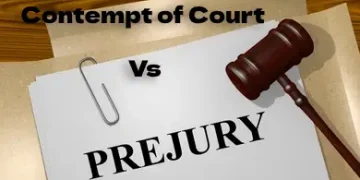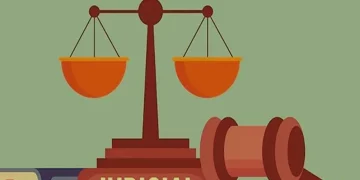It is quite common to witness vexatious litigations that are devised solely to harass and torture the other party. Resultantly, the innocently accused person has to suffer a great ordeal of defending the criminal/civil case and sometimes gets defamed by the vexatious litigation initiated by the other, both for no reason.
Law provides various ways to deal with this issue of defamation. Not only the defamed party can ask for damages by way of a civil defamation suit or malicious prosecution or both, but the person can also initiate criminal proceedings qua a criminal defamation complaint. Moreover, the person can initiate both as it is a trite law that civil and criminal proceedings can go simultaneously qua the same cause of action.
However, there are different processes and different time limits for a civil defamation suit and a criminal defamation complaint qua the same vexatious litigation. This piece of writing will be discussing the relevant provisions with the help of case laws explaining the mechanisms and time limits for both kinds of defamation cases.
Criminal Defamation
Defamation has been extensively dealt under the Indian Penal Code, 1860. Section 499 of the IPC elucidates the meaning of defamation and it includes both libel and slander, though it doesn’t differentiate between the two, unlike many other jurisprudences. It also prescribes ten exceptions to the crime. The punishment for defamation is up to two years or fine or both. Therefore, it’s qualified as a summons case and not a warrant case. The aggrieved person can initiate criminal proceedings by filing a complaint under section 200 of the Code of Criminal Procedure before a Judicial Magistrate. Thereafter, the Magistrate may take cognizance of the matter and proceed with it in accordance with the procedure provided for the summons case.
The Code provides a limitation period for initiating a criminal action for defamation. Section 468 of the Code provides a three-year time limit for filing such a complaint. The moot question is: what is the starting point of the limitation period; whether it is filing of the complaint/vexatious case by the opposite party or when the accused/defamed person gets acquitted or discharged as the case maybe? The question is fundamental to the complaint because if the complaint is filed after the time limit then the same can be set aside merely on the ground of being time-barred, despite meeting the merits otherwise.
The question is not res Integra. The said issue was settled by the Hon’ble Supreme Court in the case of Surinder Mohan Vikal vs. Ascharaj Lal Chopra, where it was held that the limitation period shall begin from the date when the opposite party had filed the complaint/case against the complainant and not when he gets acquitted.
The said decision was followed by Hon’ble High Court of Delhi in Rommy Khanna vs. State (Govt. of NCT of Delhi) & Ors., where a similar question of facts was adjudicated and the Hon’ble High Court held that:
“In Surinder Mohan Vikal (supra), Supreme Court, in the similar facts, has held that a complaint under Section 500 IPC for defamation will be barred if filed three years after the commission of the offence. Where in a complaint under Section 500 IPC it is alleged that the defamatory matter was contained in a complaint under Sections 406/420 IPC against the complainant, the period of limitation for filing a complaint under Section 500 IPC would commence from the date of the complaint under Sections 406/420 IPC and not from the date when the complainant was finally acquitted of offences under Sections 406/420 IPC.”
Recently, the Hon’ble Calcutta High Court followed the same principle in Rabindra Nath Pal vs. Ratikanta Paul & Ors and held that the cause of action arose from the date when First Information Report was registered and not from the date when the complainant was acquitted from the charge.
Thus, the accused needs to be on his toes if he wants to initiate criminal proceedings qua defamation and must not get time-barred as the time limit begins from the publication of the defamed complaint.
Civil Defamation and Malicious Prosecution
The aggrieved person can not only initiate criminal proceedings against the wrongdoer but can also seek damages qua malicious prosecution and civil defamation. The civil suit provides compensation to the aggrieved party which is not available in criminal defamation complaint. Moreover, the burden of proof is slightly lesser in a civil case as civil suits do not follow the principle of ‘proof beyond reasonable doubt’. However, in the civil suit for defamation and malicious prosecution, the plaintiff is burdened with a court fee based upon the amount claimed, whereas in a criminal complaint the court fee is negligible.
The time limit of filing civil defamation is just one year. Moreover, the plaintiff can file the suit seeking damages after his acquittal in the concerned criminal case. This aspect is strikingly different from the criminal complaint, where the clock begins from the date of filing of the complaint and not from the date of acquittal/discharge, as the case may be.
In the case titled Shri Ram Singh Batra vs. Smt. Shran Premi, the Hon’ble High Court of Delhi propounded the following four essential ingredients to initiate a suit for malicious prosecution:
- Plaintiff was prosecuted by the defendant;
- The criminal case was terminated in favour of the plaintiff;
- The criminal case was in bad faith; and
- There was no reasonable cause to initiate the criminal case.
Further, the Hon’ble Court succinctly stated that the plaintiff can file the suit for defamation against the alleged defamatory complaint/statement to a lawful authority only when it is proved that the same is false and defamatory unless it is defamatory per-se.
Moreover, the Hon’ble High Court of Delhi in Vijay Gulati vs. Radhika & Ors., held that where a civil suit for defamation is sought on the basis of registration of the criminal case, then such a suit can be entertained only after the acquittal or discharge of the plaintiff from the criminal case.
The Hon’ble High Court of Delhi in Mahadev I. Todale vs. Frankfinn Aviation Services Pvt. Ltd. & Ors. has discussed catena of judgments including the aforesaid two case laws and held that in the light of pendency of framing of charge, if any against the defendant in a criminal case, the suit for defamation is premature and deserves to be dismissed.
The aforesaid discussion shows the complexity of law qua the subject matter of defamation. on the one hand, the criminal complaint of defamation is based upon the defamatory statements made out in the complaint and the limitation law doesn’t permit the plaintiff to wait for his acquittal or discharge. Whereas on the other hand, the civil suit for defamation largely depends upon the acquittal/discharge of the plaintiff in the criminal case and the plaintiff in most of the cases is not permitted to initiate the suit during the pendency of the criminal case. Moreover, the suit for malicious prosecution is entirely based upon the completion/ failure of the prosecution in favour of the plaintiff.
The difference in timelines does make the mechanism complex. But in totality, it’s quite fair and logical. Until the prosecution (criminal case file against the accused person) doesn’t reach its final conclusion, the plea of damages and compensation by way of the civil suit would be a farfetched idea. Whereas, if the complaint prima facie discloses the defamatory remark, then the accused person doesn’t have to wait for long litigation battles in order to seek justice. The timelines are indeed different, but they serve different purposes as discussed above and therefore strike balance while considering the possibility of the success of the prosecution and the loss suffered by the accused person due to vexatious litigation.

















